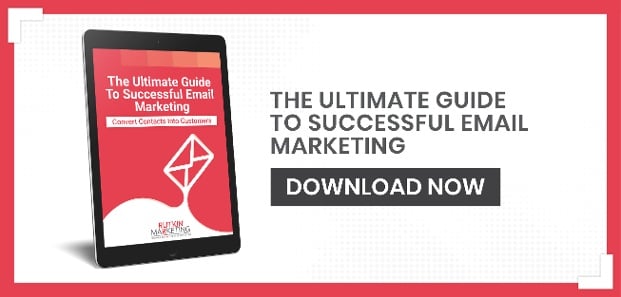Which Email Marketing Platform Should I Choose?

It can be overwhelming to research various email marketing platforms. On the surface, it seems like they all do the same thing. They do, to a degree. However, each platform varies among providers. After reading this article, you will have a better idea of which platform will be best to meet the needs of your company.
Things to Consider
When picking an email marketing automation platform, there are a few things to consider to make an informed decision for your company.
Goals
The first step to building ANY marketing strategy is taking a step back and understanding the why behind your efforts. Too often, we see clients make the mistake of building a strategy around a platform or tactic without considering what they’re trying to accomplish. Most successful marketing strategies focus on business objectives first, then work backward from there.
A successful marketing strategy should include all of the following:
- Clear business objectives. Of course, without clearly defined objectives and goals, no campaign will accomplish anything. So, what are your objectives?
- A defined strategy to get there. What are the things you need to do to accomplish these business objectives?
- All associated costs and efforts that are necessary from you (the business owner) or your team. You can also outsource it. Time is money, too!
Remember, your strategy can only be as effective as YOU, the owner or manager, let it be.
- Do you need more leads or traffic, to build an email list, or grow sales?
- Do you need a new CRM, Email Marketing, or Marketing Automation system to be more productive?
- Do you need a more predictive sales process with funnel management procedures?
- Do you have the resources and time to do it in-house, or does it make sense to outsource?
Budget
The next step to consider is how much your company is willing to spend on resources to manage your email marketing. Price points can vary based on the number of subscribers, automation features, available support, branding features, integrations, analytics, and much more. Consider what your company needs and see which price point best meets your needs.
Subscribers
Some platforms will have you pay based on the number of subscribers you have. We recommend this type of platform to companies that aren’t focused on growing their email list. For example, one of our clients is a commercial construction company, and their client base consists of executives. They focus their attention on keeping consistent communication with their existing clients and sending a few emails per month. In contrast, a technology or software company would try to get as many decision-makers and influencers that meet their ideal customer profile as possible on their email list because that provides more potential for them to reach their sales targets.
Features
There are basic email marketing platforms that are best for small businesses that don’t need anything too fancy. These platforms are typically less expensive but they don’t offer as many features as platforms made for midsized to enterprise companies. Some features you can look out for include:
- Workflows Automation
- Emails
- Landing pages
- Forms
- Blog pages
- Analytics and reporting
- A/B testing
- Social media integration
- Number of users
- CRM
Popular Email Marketing Platforms
Now that you know what to search for in an email marketing platform, let’s go over a few popular platforms you may want to continue researching.
Hubspot
Hubspot is the number one all-in-one platform for B2B businesses and the one we recommend the most to our clients. We find this CRM platform has all the tools you need for marketing, sales, content management, and customer service. The features are more robust yet easy to use, plus it offers an interface that’s easy to navigate and find what you need. It’s your one-stop-shop for marketers to attract, engage, convert, and measure your marketing efforts.
Pros: With flexible and intuitive landing pages, forms, social media, blogs, emails, workflows, and reporting, you’re set to make a huge impact on your company’s ROI and team’s efficiency in getting things done fast and efficiently. HubSpot also offers insights and reporting to track your traffic, campaign, and contact analytics so you can make informed decisions that improve your marketing efforts. It offers a free version to start.
Cons: Hubspot is priced by the number of contacts, so you need to structure your contacts as either “marketing contacts” or “non-marketing contacts” to be organized on what you are willing to invest.
Our recommendation: It’s our favorite platform for B2B marketing and the one we recommend to
most of our clients because, in our experience, the features and customer support offered are
more robust than the competition. It offers an interface that’s easy to navigate and find what you
are looking for to improve results.
Pardot (a.k.a. Marketing Cloud Account Management)
Salesforce has renamed Pardot as Marketing Cloud Account Management, which is a good platform for B2B businesses that either have an internal or outsourced expert on staff to operate it and pull reports. With powerful automation tools, your company can find more leads and maximize marketing ROI.
Pros: Pardot is an intuitive platform for email marketing and campaign tracking that can easily identify hot leads. It automates almost all steps customers take in the Buyer’s Journey.
Cons: Pardot is best used in conjunction with the Salesforce CRM platform. It requires having additional resources highly skilled in both products to use it and measure your success. It does not offer easy reporting to see which campaigns attribute to converting from visitor traffic to leads, opportunities, and revenue. If your company isn’t currently using Salesforce, Pardot isn’t the platform for you.
Our recommendation: Marketing Cloud Account Management is a good platform for B2B businesses that use Salesforce and either have an internal or outsourced expert on staff to operate it and pull reports.
Constant Contact
Constant Contact is an easy-to-navigate, intuitive platform, perfect for beginners and small businesses.
Pros: Best for small businesses. Reasonably priced for small contact lists with a 60-day free trial, Constant Contact offers a good deliverability rate, reaching the most popular email providers the majority of the time as well as offering a massive number of apps and integrations. It can also incorporate event campaign management, questionnaires, coupons, and more.
Cons: There is a lack of advanced features and there is limited automation flexibility.
Our recommendation: A good platform for beginners and small business owners who need basic
automation and have a limited number of contacts.
Mailchimp
Mailchimp is a perfect “foot in the door” for small businesses or entrepreneurs looking to get started with email marketing. With low pricing (and even a free option), anyone can start sending emails to their clients.
Pros: Mailchimp has a free version, so there’s no excuse not to be emailing your customers!
Cons: Once you reach a certain number of subscribers, your monthly price will increase and will continue doing so as you reach certain thresholds. It doesn’t offer full insight, workflows, and reporting analytics to track how users interact within your website.
Our recommendation: MailChimp is a good platform for small businesses or solo practitioners seeking a quick email marketing solution.
ActiveCampaign
ActiveCampaign has different features based on the customers you serve. Marketing business-to-consumers (B2C) versus business-to-business (B2B) requires different strategies, and therefore email marketing features.
Pros: ActiveCampaign allows you to create powerful automated marketing and sales processes,
allowing you to send personalized relevant messages. It is also excellent in list management and
getting emails delivered. They offer standard customer support in English but also in five languages, which is not so standard.
Cons: ActiveCampaign has a bit of a clunky interface, which can make it difficult to learn and navigate and it’s on the pricier end of the spectrum.
Our recommendation: ActiveCampaign can be the best choice if you have advanced skills, are serious about marketing automation, and looking for an all-in-one tool.
Choosing the Right Platform for You
When researching different platforms, we recommend seeing a demo of each product to ensure the platform has everything your company needs while considering the budget and resources to run it. You also want to take into account the number of contacts you have and the features you are looking for.
Whichever platform you decide to use, Rutkin Marketing is here to assist you in meeting your email marketing goals. We help you increase leads, customers, and marketing ROI through Inbound Marketing and Outbound Marketing strategies. Contact us today to see how we can help jumpstart your email marketing strategy to get results. Register to be added to the Email Marketing Webinar list
How to Get Started?
Rutkin Marketing is a HubSpot solutions partner and specializes in helping businesses of all sizes finetune their messaging, hone in on their marketing strategy, and grow their sales initiatives.
The professional team at Rutkin Marketing can help you identify a strong selling strategy along with an execution plan and KPIs to measure your success in the platform you choose to use.

